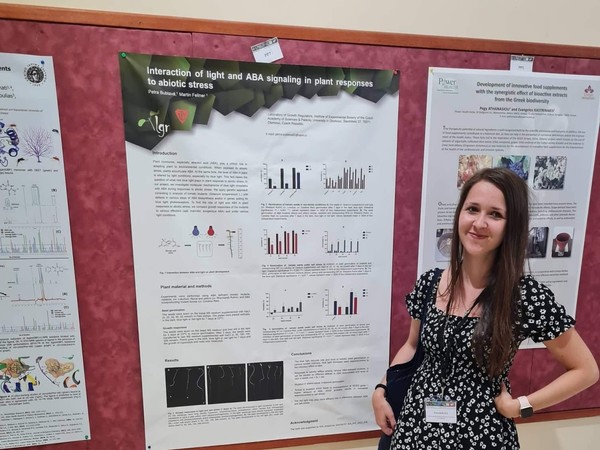First prize for the best poster out of seventy registered entries went to Petra Bublavá, a student of the Faculty of Science, at the international competition Trends in Natural Products Research: PSE Young Scientists’ Meeting, organised in Crete by the Phytochemical Society of Europe.
In the competition for young scientists, she impressed with her work entitled “Interaction of light and ABA signalling in plant responses to abiotic stress”. “I registered for the conference thanks to my thesis supervisor Martin Fellner, for which I would like to thank him. Attending the conference was a valuable experience for me. I was very surprised to win the poster category, as it was my first participation in an international conference. Moreover, I am very pleased that I managed to win this award. It is additional motivation for me to continue in my work,” said Bublavá, a doctoral student in Experimental Biology.
Under the supervision of the above-mentioned Martin Fellner from the Laboratory of Growth Regulators, she is investigating how the wavelengths of light affect the ability of plants to tolerate various abiotic stresses, such as soil salinity, osmotic stress, drought or cold that they encounter during growth and development. These stress factors have a significant impact on crop yields.
“Light is an essential condition for plant growth and development, and each wavelength of light has a more or less specific effect on plant growth. However, little is known about how which wavelength affects the ability of plants to cope with stress factors. Petra Bublavá is therefore investigating the mechanisms by which light affects this ability and whether and how the plant hormone abscisic acid (ABA) is involved in this process,” explained Fellner.
Abscisic acid is a “stress” hormone, which plants synthesise when under stress. “For example, during a drought, it closes the pores in the leaves through which the plant evaporates water. In this way, it helps the plant to conserve water. Our doctoral student uses genetic methods which consist of studying mutants which have either a deficiency or excess of abscisic acid. She will use molecular methods to study the expression of genes that may play a role in plant responses to stress. She will also study whether and how these genes are regulated by light and abscisic acid,” added Fellner.
